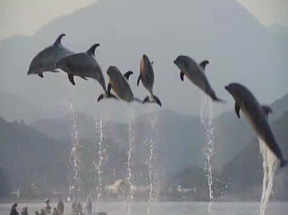Interview: The Cove
Director Louie Psihoyos and Producer Fisher Stevens
By Tom Macy
August 5, 2009
Why didn't you want to be in the movie?
Psihoyos: I didn't want to be like a Michael Moore. Like most journalists, you never want to put yourself in the story. I don't want to be an actor.
Stevens: But we brought it Mark Monroe to help plot it all out. And there was a lot of shuffling. The mercury thing was a struggle. Louie said no matter what, we have to tell the mercury story. And there was a good 45 minutes to an hour of Mercury chunks. Finding how to incorporate that was one of the most difficult things.
How did it go trying to get the Japanese to talk on camera regarding the mercury situation?
Psihoyos: There was one Japanese doctor who we showed the mercury levels in Taiji dolphin meat. He said it was a clear danger but he wouldn't allow himself to be filmed because he gets his money from the government. It's really hard to describe how much pressure there is on the media, on doctors. The government really tries to repress people to keep information from getting out.
What about Sea World?
Stevens: They wouldn't talk to us. We did this amazing screening in Vegas for the exhibitors at ShoWest. At the end, Louie and I met with everybody. And there was this very unattractive, very unfortunate looking man that started screaming "Ric O'Barry is a fake! He's a charlatan! He's full of it." And he worked for Sea World.
Phihoyos: He owns Sea World.
How do you think the Japanese Government will react to this film?
Psihoyos: It's interesting. I did a public service announcement lat year, Fish and I did, and we had it in Japanese. And we took it to the IWC (International Whaling Commission) last year, which was in Santiago, Chile. And thought, we'll just have them take a look at the film because we knew it would be another year before the it came out, but in the meantime tens of thousands of dolphins are dying and people are getting hurt because of these toxic levels of Mercury. I brought all these DVDs and I was going to hand them out like chicklets to the Japanese delegation.
I was the second to last one to get on the plane. The last guy to get on was Akira Nakamae, (the Deputy Director of the Japan Fisheries Agency). He sits down right next to me. I thought, if there's a god, he has a good sense of humor. I waited until the plane took off. He couldn't switch seats with anybody; the plane was booked. I had this guy for ten hours.
I showed him a promo of the movie. I said, this movie's coming out. It's going to make your country look horrible. It's going to make you look horrible. Here's an opportunity to do something about it and he did nothing.
Stevens: And it's not about the Japanese per se. It's about these fishermen and the Japanese government turning a blind eye. There are very few guys that are doing it and as we show in the movie, the public doesn't know anything about it.
Has there been any real fallout since the film's been finished?
Psihoyos: No, but this film is coming out and there's going to be a tsunami of pressure.
Stevens: We sold it to about 20 countries. We have a Japanese dub in the works and we are going to find a way to get it out in Japan if it's the last thing we do. And Louie's right, getting it out is going to put a lot of pressure on the Japanese government to stop this thing.
Have you gotten any reactions from other Japanese who've seen it?
Psihoyos: I showed it to the director of the Tokyo Film Festival. And he said, given that the theme of this year's festival is the environment – they're doing a green not red carpet – it'd be hypocritical not to screen it. He then said, but you have to understand that the Government pays for the festival.
What are your hopes and expectations for the film now that it's getting a proper release?
Stevens: My whole goal in making movies is to entertain. And when you entertain, that's when you get the message in there.
Psihoyos: My only goal in making a movie is to change the world.
That's a good balance.
Continued:
1
2
3
|
|
|
|




